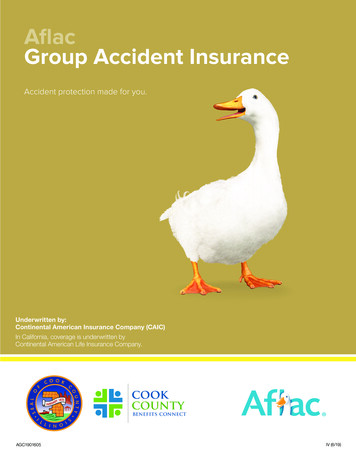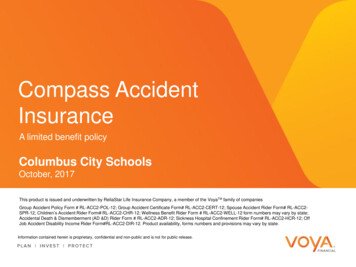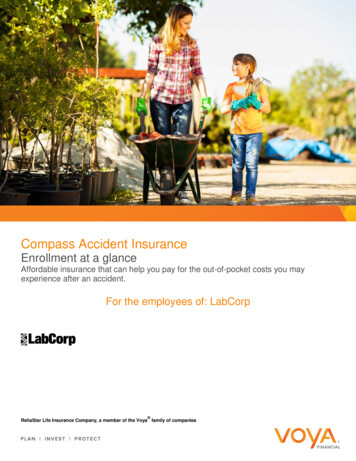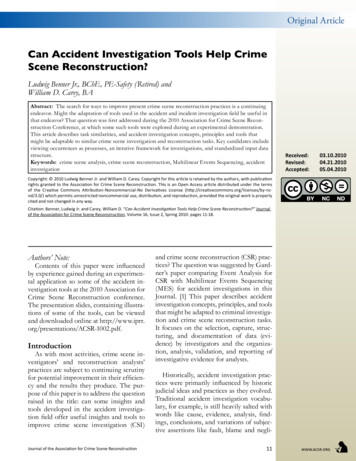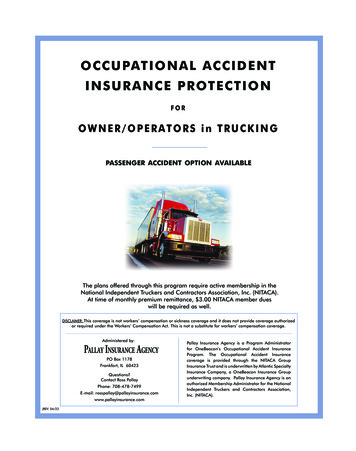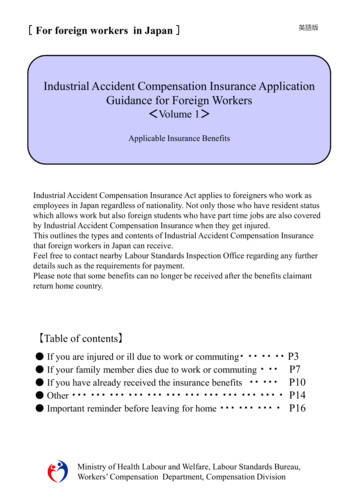
Transcription
Accident Insurance accordingto the Swiss Federal Lawon Accident Insurance (UVG)Information SheetEdition 2017Making you safer.
2Accident Insurance according to the Swiss Federal Law on Accident Insurance (UVG)Information Sheet
Accident Insurance according to the Swiss Federal Law on Accident Insurance (UVG)Information SheetContent1.2.3.4.5.6.7.8.Legal basis for the insuranceInsured personsScope of insurance coverInsurance benefits4.1. Care allowance and reimbursement of costs4.2. Daily allowances4.3. Disability pension4.4. Allowance for physical and mental impairment4.5. Helplessness care allowance4.6. Survivors’ pensions4.7. Insured earnings4.8. Adjustment of pensions to increases in the costof living4.9. Reduction and refusal of insurance benefitsProcedure in the event of an accidentPremiumsAccident preventionTransfer to individual insurance3
4Accident Insurance according to the Swiss Federal Law on Accident Insurance (UVG)Information Sheet1.Legal basis for the insuranceThe Law on Accident Insurance of 20 March 1981 aswell as the relevant ordinances form the basis for the insurance. The following details are extracts from the lawand ordinances.2.2.1.Insured personsCompulsorily insured personsAll employees, including persons working from home,interns, volunteers, trainees and apprentices, must be insured. Insurance is also compulsory for any membersof the employer’s family working for the business if theyreceive earnings in cash or pay Old Age and Survivors’Insurance (AHV) contributions.In agricultural establishments, the following persons areequated with self-employed farmers and therefore do not fallunder the compulsory scheme: the wife of the farm manager, his relatives in ascending and descending order andtheir wives, and in addition sons-in-law of the farm manager who will presumably take over operating the farm.2.2.Voluntarily insured personsSelf-employed persons and family members working intheir businesses who are not subject to compulsory insurance may insure themselves voluntarily by specialagreement.3.3.1.Scope of insurance coverInsured accidentsInsurance benefits are granted for occupational andnon-occupational accidents. Occupational illnesses areequated with occupational accidents.3.2.Part-time employeesPart-time employees whose weekly working hours forany one employer do not amount to 8 hours or more areonly insured for occupational accidents. Accidents occurring on the way to or from work are also understoodas occupational accidents for these persons.3.3.Commencement, end and suspension of insurance cove rage for employeesInsurance coverage commences on the date on which theemployee begins employment or first becomes entitled to asalary, and in any case at the time when the employee setsoff on their way to work.Insurance coverage ends on the 31st day after the date onwhich employees lose their claim to at least half of theirearnings.3.4.Optional extension of coverWith the optional extension of cover, statutory non- occupational accident insurance can be extendedfor up to 6 consecutive months. Examples: if taking unpaid leave, changing jobs, stopping work withoutcontinued pay, e.g. seasonal workers. Every employeewho works for an employer for at least 8 hours a weekand is therefore insured for non-occupational accidents can choose this. The option must be chosen before the non-occupational accident insurance coverends. The exact details are given in the special registration form, which can be obtained from the employer or Baloise.4.4.1.4.1.1Insurance benefitsCare allowance and reimbursement of costsMedical treatmentCosts will be paid for the followinga) outpatient treatment by a doctor, a dentist or by medical assistants as instructed by a doctor or dentist, aswell as outpatient treatment by a chiropractor or at ahospital;b) Medicines, drugs and analyses ordered by a doctor ordentist;c) Treatment, nursing and accommodation in the general ward of a hospital;d) Medically ordered convalescence and spa treatments;e) Any remedies and objects required for recovery.4.1.2Medical treatment abroadThe cost of medical treatment required outside of Switzerland will be refunded up to a maximum of double theamount of the expenses that would have been incurredfor treatment in Switzerland.4.1.3Nursing and care at homeContributions will be paid towards any necessary nursing and care at home, provided that such nursing andcare is carried out by approved home nursing staff, in accordance with Art. 18 of the Accident Insurance Ordinance (UVV).4.1.4Medical aidsThe insured person may claim medical aids required tocompensate for physical impairments or functional deficiencies (e.g. prostheses).4.1.5Loss of or damage to propertyThe cost of repairing damage caused as a result of an accident to property that acts as a replacement for a part ofthe body or a physical function (e.g. damage to prosthe-
Accident Insurance according to the Swiss Federal Law on Accident Insurance (UVG)Information Sheetses in use) will be reimbursed. The replacement of spectacles, hearing aids and dentures may only be claimed forin connection with a bodily injury requiring treatment.4.1.6Travel, transportation and rescue costsAny necessary emergency ambulance and rescue costsand the cost of travel and transportation required onmedical grounds will be reimbursed.c) No deductions are made for married or single persons who have to care for minors or children in education.4.3.4.3.1Emergency ambulance, rescue, travel and transportation costs incurred abroad will be reimbursed to the valueof up to 20% of the maximum amount of insured annual earnings.4.1.7Transport of deceased personsAs a rule, the costs necessary for transporting deceasedpersons to the place of interment will be reimbursed.4.1.8Funeral costsFuneral costs will be reimbursed, provided that theydo not exceed seven times the maximum insured daily earnings.4.2.4.2.1Daily allowancesEntitlement and amountIf the insured person is fully or partially unable to work asthe result of the accident, he is entitled to a daily allowance.The daily allowance will be paid per calendar day from thethird day after the date of the accident. The daily allow ance for full disability is 80 % of the insured earnings, andreduced accordingly for partial inability to work.If the insured person is entitled to a pension from theFederal Disability Insurance (IV) or a pension from theFederal Old Age and Survivors› Insurance (AHV), whether these are from a Swiss or a foreign social insurancescheme, they will be granted a supplementary pensionto supplement the AHV or IV pension and bring it upto 90% of the insured earnings, but no more than themaximum amount payable for full or partial disability.The disability pension and the supplementary pensionwill be reduced upon reaching ordinary retirement age,in accordance with Art. 20 para. 2 of the Federal Law onAccident Insurance (UVG).4.3.2ReviewIf the pensioner’s degree of disability changes significantly, the pension will be raised or reduced accordingly or discontinued.4.4.4.4.1Allowance for physical and mental impairmentEntitlementIf the insured person’s physical or mental state is permanently and considerably impaired as a result of an accident, he is entitled to a commensurate allowancefor such impairment in the form of a lump-sum benefit.4.5.4.5.1Helplessness care allowanceEntitlementIf, due to disability, the insured person permanently requires the assistance of, or supervision by another person to cope with everyday life, he is entitled to a Helplessness care allowance.4.6.4.6.1Survivors’ pensionsEntitlementIf the insured person dies as a result of the accident, thesurviving spouse and children are entitled to survivors’pensions as provided for in the applicable legislation.Daily allowances are not payable if daily allowances fordisability insurance (IV) or maternity compensation canbe claimed in accordance with the income compensation law (Erwerbsersatzgesetz).4.2.2Deduction for hospitals, sanatoriums and clinicsFor stays at hospitals, sanatoriums and clinics, the following deductions are made from the daily allowances for maintenance expenses covered by accident insurance:a) 20 % of the daily allowance, but not more thanCHF 20 for single persons without obligations tosupport or maintain a family or dependents;b) 10 % of the daily allowance, but no more than CHF 10for married persons and for single persons with obli gations to support or maintain a family or dependents, insofar as paragraph c) is not applicable;Disability pensionEntitlement and amountIf the insured person becomes up to at least 10 per centdisabled as a result of an accident, they are entitled toa disability pension if the accident occurs before theyreach the ordinary retirement age.5
6Accident Insurance according to the Swiss Federal Law on Accident Insurance (UVG)Information Sheet4.6.24.7.4.7.1Amount of pensionsIf the survivors are entitled to AHV or IV pensions,whether these are from a Swiss or a foreign social insurance scheme, they will jointly be granted a supplementary pension to bring the AHV or IV pension up to90% of the insured earnings in total, but no more thanthe total amount payable according to the aforementioned scale.Insured earningsMaximum amountDaily allowances and pensions are computed in relationto insured earnings. Insured earnings are understoodto be the earnings significant for AHV, subject to a limit of CHF 148,200 per year, or an average of CHF 406per day. Insured earnings are also understood to be those earnings on which no contributions to AHV are payable on account of the insured person’s age, furthermore family allowances granted as children’s, education andtraining or housekeeping allowances.4.8. djustment of pensions to increases in the cost ofA livingPensions are linked to the cost of living and will thus beadjusted to increases in the Swiss consumer price indexat the same time as AHV pensions.4.9.4.9.1Reduction and refusal of insurance benefitsHealth impairments resulting from various causesDisability pensions, allowances for physical and mental impairment and survivors’ pensions will be reduced accordingly if the health impairment or death is onlypartly the result of an accident.4.9.2to him will be reduced; in particularly serious cases theymay be refused.4.9.3Monetary benefits will be reduced by at least half in thecase of non-occupational accidents which occur due to:a) Participation in brawls or fights, unless the insuredperson was injured by the persons fighting while trying to assist a defenseless person or was an innocentbystander;b) Hazards to which the insured person exposes himselfby severely provoking others;c) Participation in civil unrest.4.9.4Hazardous risksIn the case of non-occupational accidents origi natingfrom a hazardous risk, monetary benefits will be reducedby half or, in particularly serious cases, refused. Hazardous risks are actions that expose the insured person toa particularly high level of danger, where the insuredperson did not or was not able to take the precautionsneeded to limit the risk to a sensible level. However, actions taken to rescue other persons are insured even ifthey are to be considered hazardous.5.5.1.Procedure in the event of an accidentNotification of an accidentThe person who has suffered an accident or that person’srelatives must notify the employer or the insurer of theaccident without delay.Fraudulent claimsIf the insured person deliberately causes his own death orbrings about damage to his own health, there will be noentitlement to insurance benefits, except for funeral costs.If the insured person has caused the accident by gross negligence, the benefits paid for non-occupational accidentswill be reduced in the first two years following the accident.If the insured person has caused the accident by an intended criminal act or an offence, benefits can be reduced orin serious cases refused.If a survivor has deliberately caused the death of the insured person, he has no claim to monetary benefits.If a survivor has caused the death of the insured personthrough gross negligence, the monetary benefits payableExtraordinary hazardsAll insurance benefits will be refused for accidents thatoccur while the insured person is in foreign military service or participating in warlike activities, acts of terrorism or organized crime.The employer must notify the insurer immediately uponlearning that an insured person has suffered an accident.5.2.Consequences of f ailing to report an accidentShould the insured person or his survivors fail to reportan accident without reasonable excuse, the insurer mayreduce certain or all benefits by half for the duration ofthe failure to report or overall or – in the case of deliberately false notification – refuse to pay any benefits at all.If the employer fails to report an accident without reasonable excuse, the insurer may hold him liable for anyfinancial consequences.
Accident Insurance according to the Swiss Federal Law on Accident Insurance (UVG)Information Sheet5.3.Medical examinationThe insured person must undergo medical examinations as required by the insurer at the latter’s expense.6.6.1.PremiumsPremium obligationPremiums for the compulsory insurance of occupational accidents and occupational illnesses are to be paidby the employer.Premiums for the compulsory insurance of non-occupational accidents are borne by the employee, in the absence of any other arrangements in favor of the employee.The entire premium is owed by the employer, who willdeduct the employee’s share from the latter’s wages.6.2.Due date, payment periodThe premium is determined per insurance year and ispayable in advance by the date specified in the policy.The payment period for premiums is one month afterthe due date. If this deadline is not observed, the employer will be charged default interest of 0.5 percent permonth from the expiry of this period.6.3.Premium statementThe provisional premium stated in the policy must bepaid at the beginning of the insurance year. The finalpremium is determined at the end of the insurance yearon the basis of data to be provided by the policyholder.The premium statement is based on pensionable earnings according to AHV, excluding compensation forloss of income and daily allowances for disability andmilitary insurance, as long as these earnings do not exceed the maximum insured earnings. Further details canbe found on the earnings declaration form.If a lump-sum premium has been agreed upon, there isno need for a premium statement. However, in such cases the policyholder is nevertheless obligated to keep an account of earnings.The insurer has the right to check the information provided by the policyholder by inspecting all the relevantdocuments (earnings statements, AHV statements, etc.).7.7.1.Accident preventionStatutory regulationsRegulations on the prevention of accidents and occupational illnesses are prescribed by law.7.2.Duties of employers and employeesThe employer, in cooperation with his employees, musttake all measures appropriate to the given circumstances. Employees are obligated in particular to make useof personal protection equipment and the safety facilities provided.8.8.1.Transfer to individual insuranceRight to transferPersons living in Switzerland have the right to transferto individual insurance cover within 31 days of leavingthe UVG insurance.7
Baloise Insurance LtdAeschengraben 21, P.O. BoxCH-4002 BaselMaking you safer.www.baloise.ch220.1082 e 4.16 500Customer Service 00800 24 800 800Fax 41 58 285 90 73customerservice@baloise.ch
Insurance coverage ends on the 31st day after the date on which employees lose their claim to at least half of their earnings. 3.4. Optional extension of cover With the optional extension of cover, statutory non-occupational accident insurance can be extended for up to 6 consecutive months. Examples: if taking



